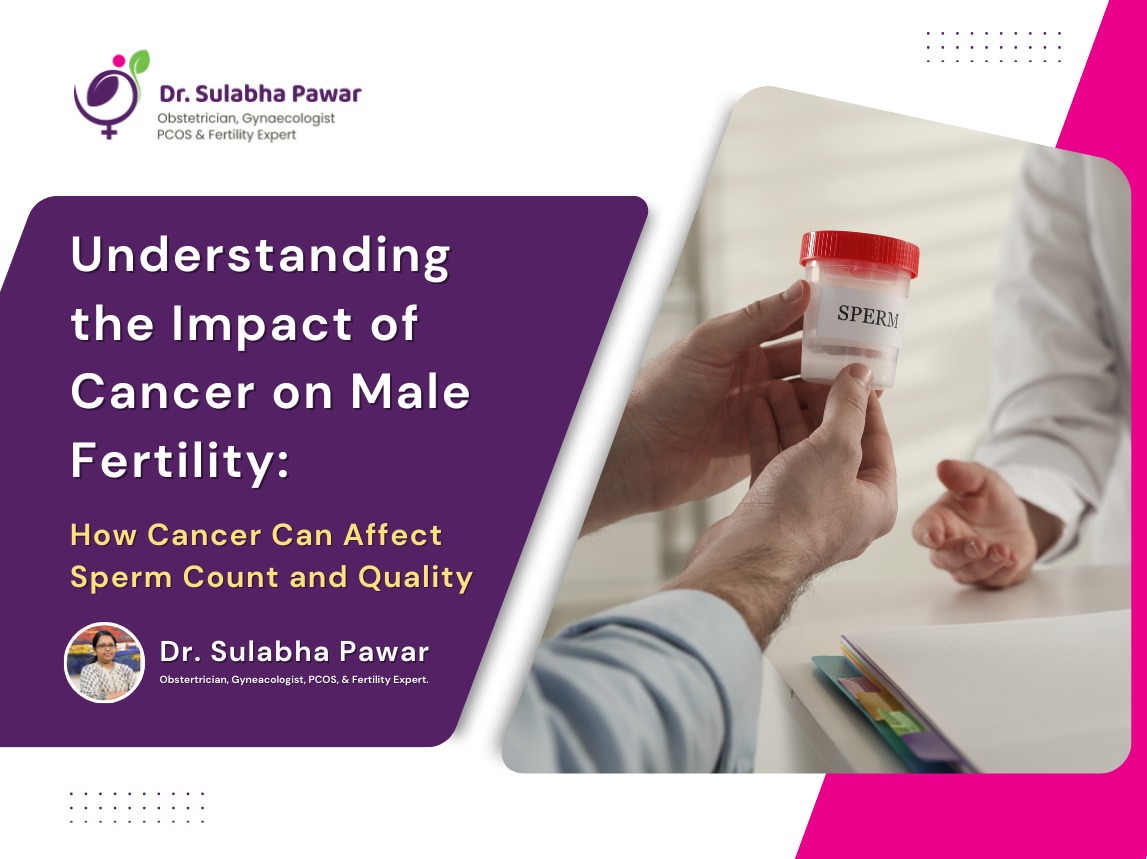How Cancer Can Affect Sperm Count and Quality - Dr. Sulabha Pawar
Introduction
Fertility can be influenced by numerous factors, one of which is cancer. Cancer and its treatments can have profound effects on sperm health, sometimes causing temporary or even permanent reductions in sperm count. While many people are familiar with the impact of lifestyle choices on fertility, the effects of cancer on reproductive health are often less understood. For men diagnosed with cancer, concerns about fertility can be as distressing as the disease itself. In this blog, we’ll explore how cancer can impact male fertility, specifically focusing on sperm count, and discuss potential options for preserving fertility.
1. How Cancer Impacts Male Reproductive Health
Cancer, depending on its type and location, can directly or indirectly affect male reproductive organs. Testicular, prostate, and pituitary gland cancers, in particular, are directly linked to fertility issues. However, other types of cancer can also have systemic effects, impacting hormone production, reducing sexual drive, or causing fatigue that affects overall health, including reproductive function.
Cancer can lead to the following challenges in male fertility:
- Reduction in Sperm Count: Certain cancers, especially those affecting reproductive organs, may lead to a reduced sperm count, making it difficult to conceive.
- Hormonal Imbalance: Cancer affecting the endocrine system (like the pituitary gland) can cause hormonal imbalances, which in turn can affect sperm production and health.
- Ejaculatory Dysfunction: In some cases, cancer can lead to nerve damage, resulting in difficulty ejaculating.
2. The Role of Cancer Treatments in Affecting Sperm Count
Cancer treatments like chemotherapy, radiation, and surgery are designed to target and eliminate cancer cells, but they often affect other rapidly dividing cells in the body as well, including sperm cells.
Chemotherapy
Chemotherapy targets fast-growing cells, and since sperm cells are among the most rapidly dividing cells, they can be highly susceptible to chemotherapy drugs. Men undergoing chemotherapy may experience:
- Temporary Infertility: Some men may experience a temporary drop in sperm count, which might return to normal after treatment.
- Permanent Infertility: Unfortunately, certain drugs or high-dose chemotherapy can permanently damage sperm-producing cells in the testes.
Radiation Therapy
Radiation aimed near or around the pelvic area can have significant repercussions on fertility:
- Direct Damage to Testes: When radiation is targeted at or near the testicles, it can directly damage sperm cells or the cells responsible for producing sperm.
- Potential Genetic Damage: Radiation can potentially cause mutations in sperm DNA, which is a concern for men looking to conceive after cancer treatment.
Surgery
Surgical removal of reproductive organs, such as the testicles, in cases of testicular cancer can directly impact fertility. In addition, surgeries involving the prostate or bladder can potentially lead to ejaculatory issues or retrograde ejaculation, where semen enters the bladder instead of being released.
3. Types of Cancer Most Likely to Affect Sperm Count
Several cancers are more likely to directly or indirectly impact sperm count, including:
- Testicular Cancer: This type directly impacts the testes, where sperm production occurs.
- Prostate Cancer: Treatment for prostate cancer, especially surgery, can impact semen production and ejaculation.
- Leukemia and Lymphoma: Blood cancers often require intensive chemotherapy and sometimes radiation, both of which can significantly impact sperm production.
4. Can Sperm Count Recover After Cancer Treatment?
The potential for sperm count recovery after cancer treatment depends on multiple factors:
- Type and Duration of Treatment: Certain chemotherapy drugs are more likely to cause lasting infertility. Shorter courses may have less impact, but each case is unique.
- Patient’s Age: Younger patients are generally more likely to regain fertility post-treatment than older individuals.
- Type of Cancer: Certain cancers, especially those directly involving the reproductive organs, may lead to long-term fertility issues.
In some cases, sperm count may start to recover within months, but it might take several years for sperm count and motility to return to pre-treatment levels, if at all.
5. Preserving Fertility: Options for Men Diagnosed with Cancer
Men diagnosed with cancer should discuss fertility preservation options with their healthcare team before starting treatment. Options include:
- Sperm Banking: This is the most common method of fertility preservation. Sperm banking involves collecting and freezing sperm samples for future use.
- Testicular Sperm Extraction (TESE): In cases where sperm is not present in the ejaculate, testicular sperm extraction can retrieve sperm directly from the testes.
- Hormonal Therapy: Hormone therapy may sometimes be considered to help protect sperm production during cancer treatment, though this approach is less commonly used.
6. What to Know About Fertility After Cancer: A Personal Decision
After cancer treatment, not all men experience infertility. Some may still retain enough sperm to conceive naturally, while others may face challenges. For those who preserved sperm beforehand, assisted reproductive techniques like IVF or ICSI can increase the chances of successful conception.
Conclusion
The relationship between cancer and fertility is complex, but understanding the potential risks can help men make informed choices about fertility preservation. If you or a loved one is facing cancer and concerned about fertility, consult a fertility specialist and explore your options for maintaining reproductive health during and after treatment.




